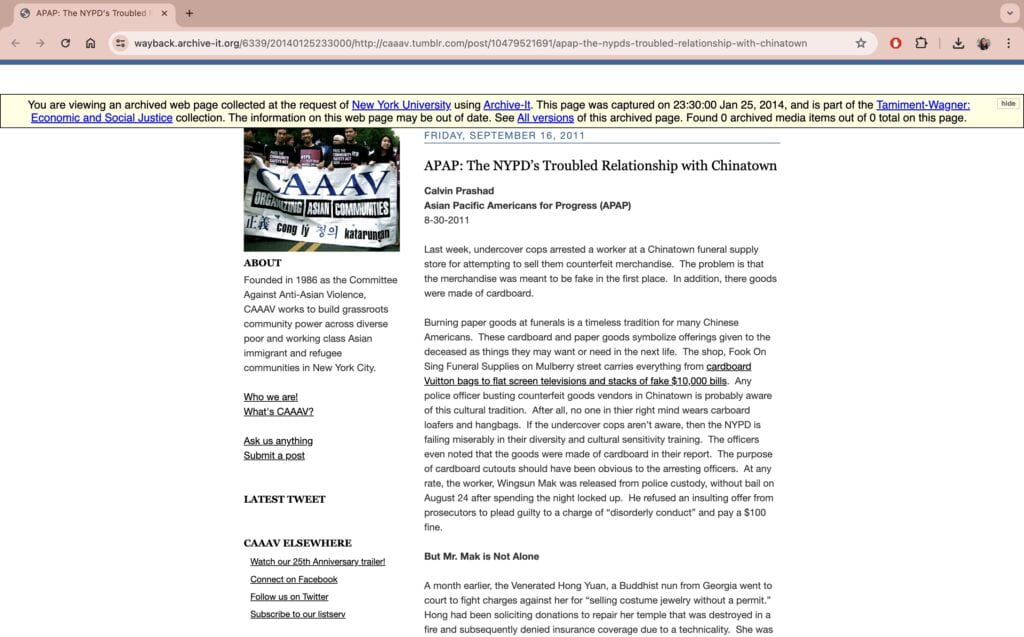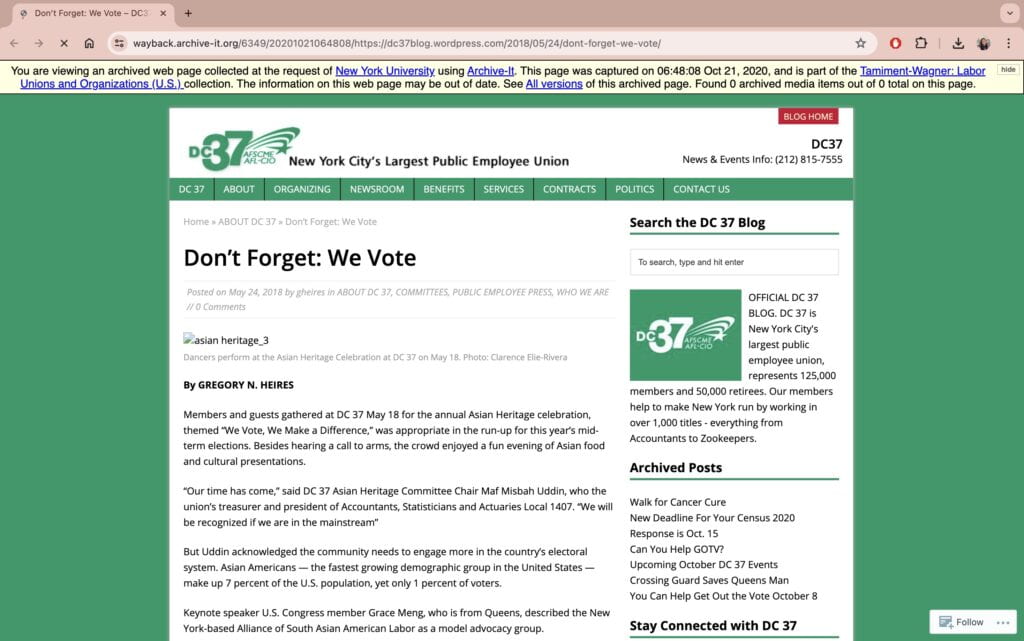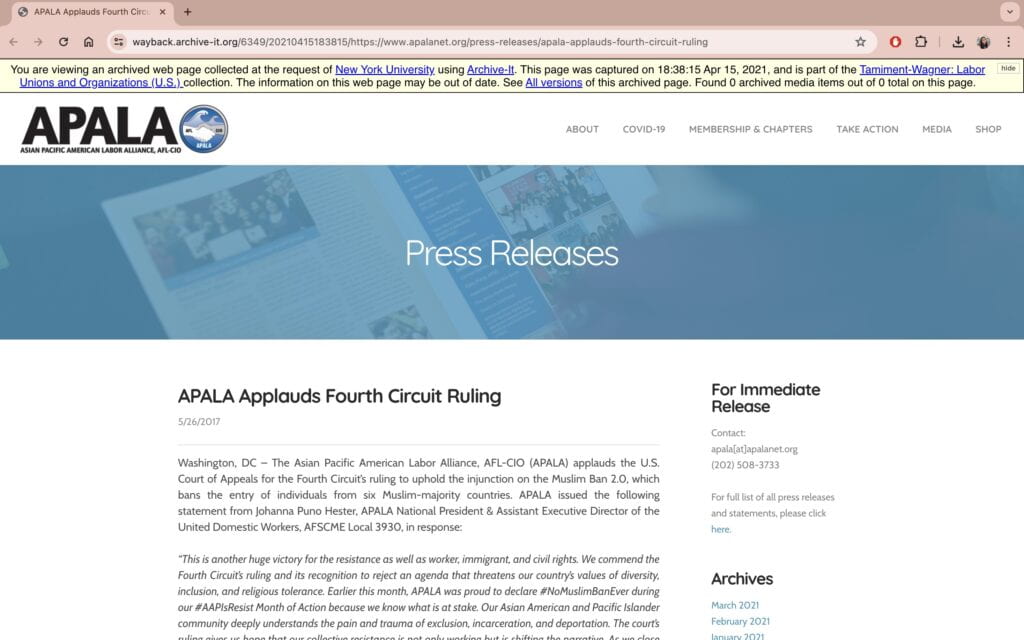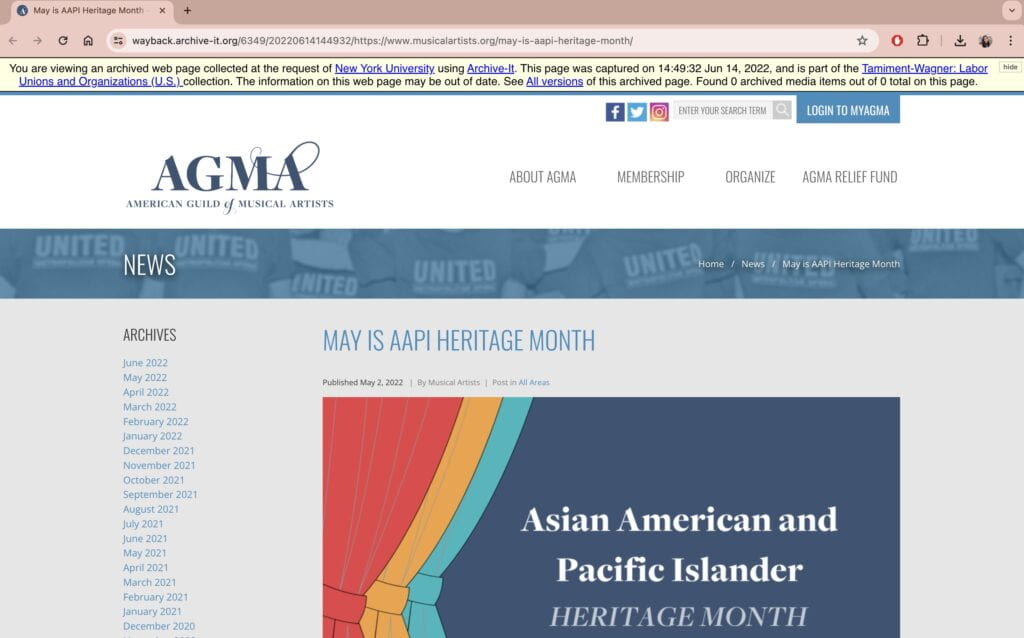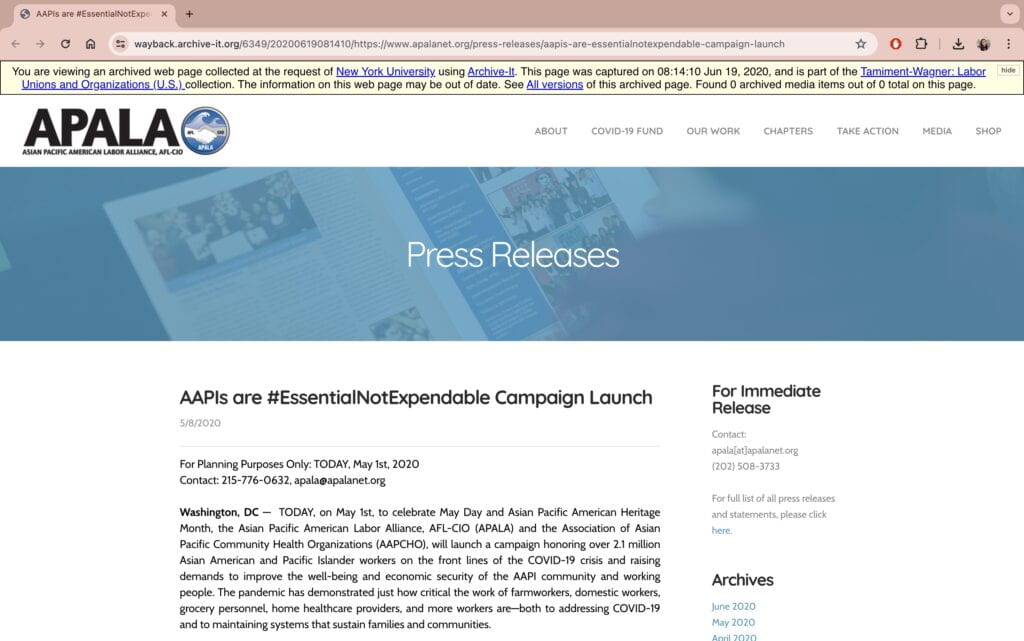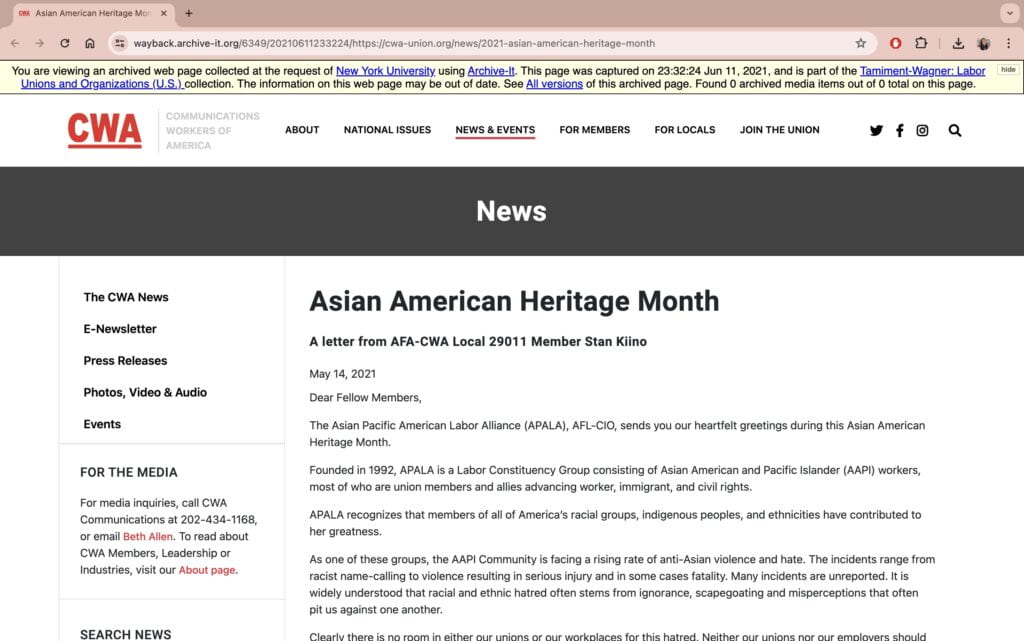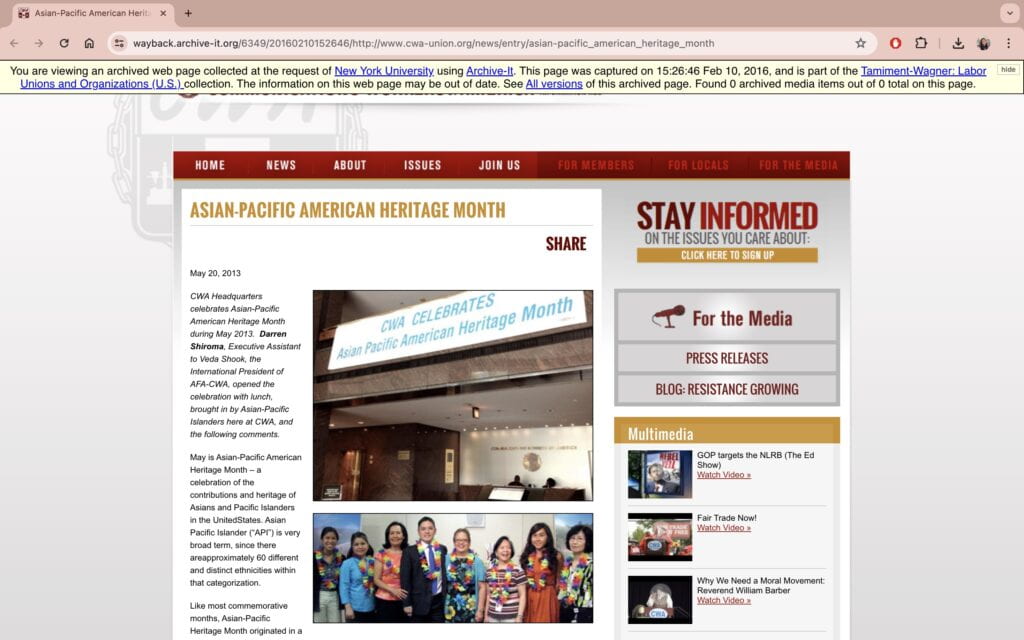Celebrating AAPI Heritage Month with NYU’s Web Archives
This post is written by Lizzy Zarate, the Web Archives Student Assistant for Archival Collections Management. She is an MA student at NYU in the Archives & Public History Program.
May 1st marks the start of Asian American and Pacific Islander (AAPI) Heritage Month. While NYU Special Collections contains a wealth of fascinating paper, photographic, and audiovisual materials pertaining to Asian American and Pacific Islander history, I’d like to take this moment to uncover AAPI experiences within our web collections.
In 2011, Calvin Prashad of Asian Pacific Americans for Progress wrote about several instances of the NYPD’s mistreatment and arrest of business owners in Chinatown. The Committee Against Asian Violence reposted this article on their Tumblr, and as of 2024, it appears that this Tumblr blog has been taken down and no versions of the article exist anywhere on the live web. As part of the Tamiment Library’s Economic and Social Justice Collection, the post serves as documentation of the harassment faced by communities of color, particularly immigrants, at the hands of law enforcement. Without web preservation initiatives, these narratives run the risk of being lost to time.
To further expand on AAPI perspectives in the web archives, we can examine how websites in the Tamiment Library’s Labor Unions and Organizations Collection have acknowledged and celebrated this month in past years. In 2018, public sector employee union District Council 37 celebrated AAPI Heritage Month at their headquarters in lower Manhattan. The event highlighted the importance of civic engagement for the Asian American community, particularly in the wake of the 2017 travel ban imposed by the Trump administration. Cultural heritage celebrations thus became a mechanism for resistance to this political rhetoric, celebrating diversity within communities. On a similar note, APALA also released a statement in 2017 condemning the Trump administration’s treatment towards Muslim communities. Looking at these sources in tandem helps indicate how political events impacted online discourse. These pages open the door for further research and historical inquiry into the way Asian American communities responded to the events of the Trump administration.
The COVID-19 pandemic led to an increase in organizational communication via websites. During the initial lockdown in 2020, labor unions engaged in cross-organizational collaboration to address the rise in hate crimes against Asian Americans and Pacific Islanders, particularly those of Chinese descent. This resolution passed by the New York City Central Labor Council in conjunction with the Asian Pacific American Labor Alliance indicates a push for collaboration between institutions. Whereas AAPI Heritage Month posts written in the early 2010s were less likely to address the intersectionality of social justice movements, more recent posts tend to acknowledge the overlap with other communities and push for solidarity.
It is worth pointing out that various labor unions and organizations will use their websites differently, so the absence of AAPI member recognition in certain websites doesn’t necessarily signal a lack of interest from the organization. While the websites mentioned in this article frequently use their pages to communicate with members, other organizations with a less technologically-inclined member base may still rely on paper or other offline-based communication. In addition, seed URLs change, pages get lost in crawls, and other platforms where organizations might have acknowledged AAPI heritage – for example, social media pages like Twitter and Facebook – are currently unable to be captured due to crawler issues.
For example, the American Guild of Musical Artists observed AAPI Heritage Month in 2022 by spotlighting members of the guild in their social media stories. Social media for AGMA is not collected by NYU, so researchers in the future may not be able to view the stories in question if they were not preserved at the time of posting. Social media is notoriously difficult to capture in general; as of May 2024, Archive-It’s system status page lists issues with Facebook, Instagram, TikTok, Twitter, and YouTube playback. All of these platforms are increasingly used by organizations to disseminate information, so it’s hard to say what kind of content relating to AAPI history is not being documented as a result of current technical limitations.
The Asian Pacific American Labor Alliance launched the #EssentialNotExpendable campaign in May 2020 to raise awareness of the struggles faced by AAPI laborers during the initial outbreak of COVID-19. Once again, much of the campaign took place on Facebook Live and Twitter, neither of which were captured. Regardless, the existence of this page and campaign demonstrates a concerted effort from labor organizations to combat the rise of Asian hate crimes during lockdown, which posed a threat to the safety of essential workers across the country.
The Communications Workers of America Union acknowledged AAPI Heritage Month in 2021, emphasizing the rise in anti-Asian discrimination and violence in the wake of the pandemic and urging for change. Once again, this statement emphasizes that anti-Asian sentiment is a struggle that intersects broadly with discrimination against other marginalized communities. With this statement, APALA board member Stan Kiino reiterates the viewpoint that “an injury to one is an injury to all.”
We can compare the 2021 statement with CWA’s post about AAPI Heritage Month 2013, captured in a 2016 crawl of the website. Beyond the differences in visual design, the two statements also differ in audience and tone. While the 2021 statement was more public-facing, this post appears to be more specific to CWA headquarters, referencing a building-wide celebration. Notably, the post directly thanks the members who brought food for the event and the organizers of the event by first name. In the past, the relatively unregulated format of blogs and user-generated content led people to use the Internet as a much more casual space for expressing ideas. While this is certainly still a function of today’s Internet, websites of official organizations are expected to adhere to a more impersonal format. This is compounded by the fact that many organizations have replaced paper and telephone communication with websites, e-mail, and social media, meaning that traditional institutional communication standards have effectively been transferred over to online platforms. The shift in tone between CWA statements, nearly ten years apart, exemplifies the change in the way that websites were conceptualized over time.
Ultimately, these websites demonstrate how marginalized communities can find their histories in a wide variety of collections. While a collection on labor unions might not explicitly state its relation to AAPI history, the intersection of these causes allows us to learn more about the overlap between social justice movements. As an Asian American archivist preparing to graduate this month, I hope to use this experience in my future work to highlight previously unseen perspectives within the archive. Happy AAPI Heritage Month!
Works Cited
- Committee Against Asian Violence Tumblr; Jan 25, 2014; Tamiment-Wagner: Economic and Social Justice Web Archive; https://wayback.archive-it.org/6339/20140125233000/http://caaav.tumblr.com/post/10479521691/apap-the-nypds-troubled-relationship-with-chinatown; Tamiment Library/Robert F. Wagner Labor Archives, New York University.
- District Council 37 Blog; October 21, 2020; American Federation of State, County, and Municipal Employees (AFSCME), District Council 37 Records; WAG 265; https://wayback.archive-it.org/6349/20201021064808/https://dc37blog.wordpress.com/2018/05/24/dont-forget-we-vote/; Tamiment Library/Robert F. Wagner Labor Archives, New York University.
- New York City Central Labor Council; May 29, 2020; New York City Central Labor Council Records; WAG 049; https://wayback.archive-it.org/6349/20200529152306/https://www.nycclc.org/sites/default/files/attached-files/resources/NYC%20CLC%20Executive%20Board%20Resolutions/apalaresolution.pdf; Tamiment Library/Robert F. Wagner Labor Archives, New York University.
- American Guild of Music Artists; June 14, 2022; American Guild of Musical Artists Records; WAG 209; https://wayback.archive-it.org/6349/20220614144932/https://www.musicalartists.org/may-is-aapi-heritage-month/; Tamiment Library/Robert F. Wagner Labor Archives, New York University.
- Asian Pacific American Labor Alliance Webpage; June 19, 2020; Asian Pacific American Labor Alliance (APALA) Records; WAG 324; https://wayback.archive-it.org/6349/20200619081410/https://www.apalanet.org/press-releases/aapis-are-essentialnotexpendable-campaign-launch; Tamiment Library/Robert F. Wagner Labor Archives, New York University.
- Communications Workers of America Webpage; June 11, 2021; Communications Workers of America Records; WAG 124; https://wayback.archive-it.org/6349/20210611233224/https://cwa-union.org/news/2021-asian-american-heritage-month; Tamiment Library/Robert F. Wagner Labor Archives, New York University.
- Communications Workers of America Webpage; Feb 10, 2016; Communications Workers of America Records; WAG 124; https://wayback.archive-it.org/6349/20160210152646/http://www.cwa-union.org/news/entry/asian-pacific_american_heritage_month; Tamiment Library/Robert F. Wagner Labor Archives, New York University.
